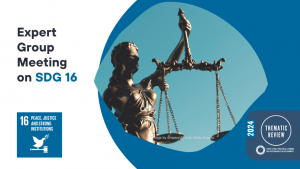
In the face of global crises, progressing towards Sustainable Development Goal (SDG) 16—promoting peaceful, inclusive societies, justice for all, and accountable institutions—is a cross-cutting enabler for the 2030 Agenda. SDG16 intertwines with the other SDGs, underscoring the importance of governance, human rights, and multilateral agreements for a just transition.
This was the focus of the recent UN Expert Group Meeting on SDG16 which will inform the thematic review of SDG16 at the 2024 High-Level Political Forum (HLPF) and shape preparations for the 2024 Summit of the Future.
Mr. Ray Pilcher, Chair of the UNECE Group of Experts on Coal Mine Methane (CMM) and Just Transition, emphasized that effective regulations and standardizations are essential for a fair transition, especially regarding coal mine closures. He presented legislative examples that demonstrate how good governance can drive sustainable economic development, highlighting the importance of managing coal mine methane and repurposing mining sites. Integrating human rights principles, gender equality, and youth engagement into resource management policies is fundamental, particularly in artisanal and small-scale mining.
He also highlighted the significance of the UNECE Aarhus Convention to enhance transparency and accountability by promoting access to information, public participation, and justice in environmental matters, thereby advancing democracy and the rule of law among the Convention’s Parties and many other interested Member States. Protecting environmental defenders’ safety and rights was also a key point, where Special Rapporteur on Environmental Defenders under the Aarhus Convention, Michel Forst, is taking action.
The meeting also explored the interconnections between SDG16 and other goals such as SDG7 (affordable and clean energy) and SDG13 (climate action) and highlighted the need for ambitious Nationally Determined Contributions (NDCs) and other commitments related to SDGs 7 and 13 be addressed through the lens of SDG16 to ensure a just transition, minimize societal fractures, and avoid political instability.
Mr. Pilcher said, “Countries in the UNECE region need to openly and accurately report methane emissions and work to reduce those emissions so that we slow climate change. This is the goal of the UNECE Group of Experts that I chair. The lesser developed economies will be hit the hardest as climate change worsens. It is always the same story--the poorest amongst us are impacted the worst by increasingly stronger storms and crop failures caused by erratic weather patterns and that is the opposite of climate justice.”
Particularly significant was the discussion on the United Nations Resource Management System (UNRMS), which provides a comprehensive framework for sustainable resource management. Aligning UNRMS principles with SDG16 fosters good governance, upholds human rights, and supports implementation of multilateral agreements, ensuring that resource management is sustainable and inclusive for current and future generations.
By fostering dialogue and sharing expertise, the Expert Group Meeting on SDG16 contributes to the global agenda for a just and sustainable transition, underscoring the interconnectedness across the SDGs and the need for unified action.
The meeting was organized by the United Nations Department of Economic and Social Affairs (UNDESA).